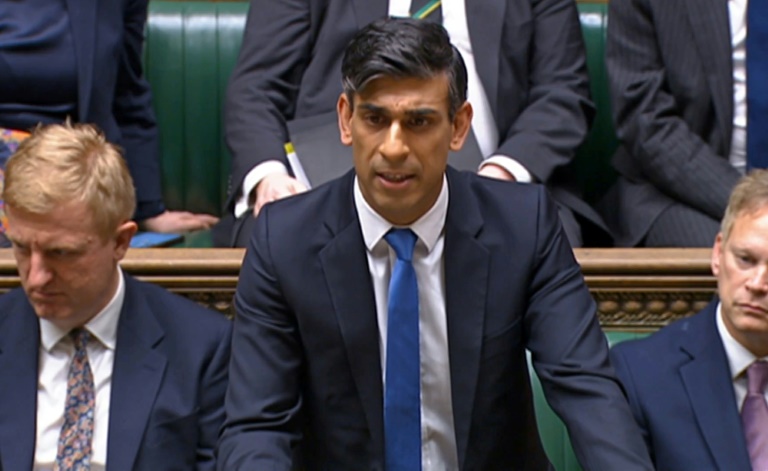Rishi Sunak has attempted to play down his £1000 Rwanda bet with Piers Morgan after it received political backlash.
The Prime Minister claimed he was “not a betting person” and said he was “taken by surprise” when he agreed to make a £1,000 wager over his Rwanda policy, during a live interview with Piers Morgan.
However, he stopped short of calling his decision to shake hands with the TalkTV host a “mistake”.
Morgan had expressed doubts over whether the government’s controversial Rwanda policy would succeed before he offered to put money into it.
“I’ll bet you £1,000 to a refugee charity [that] you don’t get anybody on those planes before the election.”
Shaking hands with the presenter, Mr Sunak said: “I want to get people on the planes.”
Speaking on BBC Radio 5 Live today, the prime minister said he was trying to convey his “absolute commitment” to the policy, and dismissed suggestions that it demonstrated he did not understand the financial pressures facing ordinary households.
The bet, which will go to charity, exceeds the £900 cost-of-living payments paid to eligible households on means-tested benefits.
Labour said it showed he was “totally out of touch with working people”.
Liberal Democrat Deputy Leader Daisy Cooper said: “Most people when they are hit with a surprise £1,000 bill worry about how they are going to make their next mortgage payments or put food on the table for their children.
“Instead, the prime minister does not even register the significance of that amount of money. Out of touch does not even begin to describe Sunak.”
The SNP said it had reported Mr Sunak for a potential breach of ministerial rules over the “grotesque” bet.
The party’s Cabinet Office spokeswoman, Kirsty Blackman, has written to the PM’s independent adviser on ministers’ interests, Sir Laurie Magnus, and Cabinet Secretary Simon Case, calling for an investigation into whether Mr Sunak broke the Ministerial Code.
In her letter, she pointed to rules that state ministers should ensure no conflict appears to arise between their public duties and private interests, and that they should not accept any gift which could appear to compromise their judgement or place them under an improper obligation.
The Rwanda Plan is currently in the final stage of passage to being passed as a Bill.
But the House of Lords, Britain’s unelected upper house of parliament inflicted a blow to the government’s controversial plan by voting to delay ratification of the treaty with Kigali.
The decision was a disappointment for Prime Minister Rishi Runak, who had urged the House of Lords to pass the plan, saying it was the will of the people.
A majority of peers – 214 against 171 – voted to delay ratification of the Rwanda treaty until the British government has demonstrated that Rwanda is a safe country for migrants who would be deported there.
And Sunak was handed a fresh setback for his Rwanda plan after the ECHR declared that it breached International Law.
The president of the European Court of Human Rights (ECHR), Síofra O’Leary, said that “there is a clear legal obligation” for states to comply with orders from the Strasbourg court.
Senior judge Ms O’Leary said the UK “has always complied with rule 39 measures”, except in one very particular case, and has “publicly declared the need for other states to comply with rule 39 indications”.
She is referring to The UK previously urging Vladimir Putin’s Russia to abide by a 2021 measure concerning the release of opposition leader Alexei Navalny.
Last year, Sunak pledged to “stop the boats”, one of his five promises after being appointed Prime Minister.
However, the plan has been stalled by legal challenges, with no deportation flights taking off yet.







